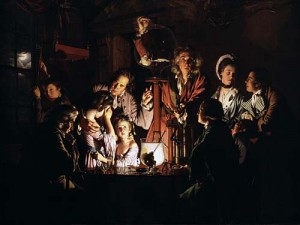
How do you refer to the worldview held by most people in America and much of the world in the 21st century? Most people aren’t even aware of their worldview as being a worldview. They think of it as “normal” or “regular” or “just plain old reality.” That’s how worldview feels to each of us, of course. The only time you find out that something you think of as “reality” is really “a point of view about reality” is by running into someone else who doesn’t see it that way. That can only happen when you meet and work with, or otherwise relate to, people in a worldview that’s not the same as yours. Since the dominant worldview is, well, dominant, most people who hold that worldview never meet anyone who sees things differently. So it never occurs to them to give a “name” to the way they see things. To them, it’s simply how things are. It’s reality.
Cultural scholars recognize that the dominant worldview we’re talking about here is only one of many possibilities, so they give it a name. Which name they give it depends on their own field of study because we all define worldviews that aren’t ours in terms of how they are not ours. Scholars and other people in the dominant culture have begun to call it by names that say what it’s “not” to them, names such as Scientism, Modernism, and Materialism. Each name refers to a different aspect of this particular, ubiquitous worldview. Because it arose in Europe during the “Age of Reason” or “The Enlightenment”, many scholars call the larger, baseline worldview “European” or “Euro-American.” But because it has clear roots back to the Ancient Greeks, and because Classic (Greek-derived) European culture is often called “Western Civilization,” the most common term for this worldview was, until recently, “Western worldview.” That is the term we primarily use on this website.
It must be acknowledged that everyone dislikes something about one name or another for the dominant culture we’re discussing here, so at present there is not a single, accepted name for it. If you refer to a point of view as being “Western,” for example, someone is bound to bristle and say, “It has nothing to do with the Greeks; it’s more ‘Industrial’ or ‘Colonialist’.” At the same time, other people will bristle the opposite direction and say, “It’s not ‘Western’. It just IS!” All this makes it even harder to communicate. Yet, as you can see in our web pages, it’s important to have a way to refer to this worldview.
It’s probably worth pointing out, in this context, the difference between worldview and culture. Many people speak of “Western culture” to refer to the European-derived worldview that can be found worldwide now. But culture refers to a specific community of peoples’ language, dress, foods, religious practices, stories, ways of living, foods, and so on. So even if you are only speakilng of European peoples, it matters that the cultures of the European continent are not uniform. They do not even align perfectly with national boundaries. In Great Britain, for instance, there are a number of cultures that have been unified into a single geo-political entity. But people of Gaelic cultures, as one example, are very aware of the cultural differences they experience, that don’t align perfectly with that geo-political identity. The same is true for cultural areas in parts of France, Spain, Germany, and so on. Many of these current nation-states have a long history of having been numerous separate, culturally-based municipalities or city-states that were unified into larger groups in some way. All this being the case, using the term “Western culture” to refer to philosophical, language, and governmental practices or standards of modern nations such as Australia, Canada, the United States, Brazil, or Mexico is inappropriate. In fact, many of those places were settled by peoples from more than one European culture, so even if you consider only the settler “cultures” there, it’s not something uniform you can simply call “culture.” The appropriate term in such a case is actually Western worldview. At the same time, the term “Western culture” has been so ubiquitous for so long, it peppers our older pages from the days before we finally decided a stand really must be taken about the necessity of changing the way that term “Western culture” is used. We are slowly replacing it with “Western worldview,” everywhere it appears on this site.
We have solved the problem in our own webpages by adopting that term “Western worldview” to refer to this “Euro-American, Western, Materialist, etc.” worldview. On occasion, we also refer to it as “dominant”, “modern” (with a lower-case “m”), and/or “contemporary” worldview, just to keep the genuine nature of things alive in peoples’ minds. We don’t use the term “dominant” all the time because it doesn’t get to be dominant in our programs. We don’t use the term “modern” all the time because there is a term “Modern” (with a capital “M”) that means very specific things, all narrower than what we mean by simply “modern”. And we don’t use the term “contemporary” by itself all the time because Indigenous and other worldviews also exist now — they are contemporary, too. We intentionally mix the terms around and change them throughout our pages to try to remind ourselves and others that the thing we’re referring to — Western worldview — is hard to pin down, elusive in its shape and dimensions, and very powerful precisely because it’s so hard to see. That which is invisible is most difficult to understand, and can most easily be present without anyone knowing it.
Incidentally, it may amuse you to know that coining terms with hard and fast definitions is a characteristic common to contemporary modern Wesern worldview itself. “Adopting a loose and unofficial convention” is a common way of doing things in Indigenous worldview. So even the way we talk about worldview depends on our worldview!
